- Home
- Deborah Harkness
The World of All Souls Page 52
The World of All Souls Read online
Page 52
He charged and he charged and he charged us again, and not one does he spare.*
Title: The Song of Armouris
Author: Unknown
Background: The Song of Armouris is a heroic account of the Byzantine people who lived on the eastern borders of Byzantium, in what is now Turkey and Syria, in the ninth, tenth, and eleventh centuries. These people of the frontier, known as the Akrites, were frequently involved in border skirmishes with Arab soldiers. Kidnappings, injuries, and the constant threat of violence hung over their families and communities. Songs and legends sprang up out of that border conflict, and The Song of Armouris is one of the earliest examples of that literature.
Two similar versions of The Song survive, one from 1461 and the other from sometime in the fifteenth or sixteenth century, indicating that this was a very popular story among the Akrites. Both versions are written in blank verse in medieval Greek and probably were taken down from a much earlier oral ballad. Only a couple hundred lines of the story have survived, but they tell an entrancing tale of a young boy called Arestis whose father, Armouris, was captured and imprisoned in Syria by Saracens. After young Arestis passes a series of tests of his skills set by his mother, the boy departs on his father’s horse, which has been mourning his rider for years. The young man announces his arrival to thousands of armed soldiers. He then kills every single soldier, except one whom he pursues for days. Arestis eventually cuts off the soldier’s hand and allows him to escape to tell the emir what has transpired. Upon learning of this feat, the emir sets the father, Armouris, free, and offers his own daughter in marriage to Arestis.
Modern scholars believe that this song might have been based upon actual events in the Byzantine-Arab conflict—namely, those surrounding the Battle of Lalakaon, in which the one-handed emir, Umar Al-Aqta (Umar with the one hand), died in 863. Philippe and Ysabeau are extraordinarily fond of this story, doubtless for its direct, simple language and lively, engaging characters and plot. And because they are very old vampires, it is possible that they have intimate acquaintance with some of the figures and events of the song. For Philippe and Ysabeau, The Song of Armouris may be a sentimental reminder of their youth, before their family responsibilities grew so weighty.
Verses by Matthew Roydon from Gonçalves Manuscript 4890 or English commonplace book
Translations
à bientôt (French) good-bye, see you soon
adieu (French) good-bye
aital aital (Occitan) so-so
à la tienne (French) cheers
alfajores (Spanish/Iberian) cookies made of honey, nuts, flour, and spices
alhamdulillah (Arabic) Thank God
Al rebèire. Mèfi (Occitan) Good-bye. Take care.
alukah (Hebrew) vampire (literally, a leech)
a ma vie de coer entire (Old French) my whole heart for my whole life
Ars longa, vita brevis. Occasio praeceps, experimentum periculosum, iudicium difficile. (Latin) Art is long, but life is short. Opportunity is fleeting, experiment dangerous, and judgment difficult.
Atta (Greek) Father
Begone, fantôme. (French) Begone, ghost.
Beniamin lupus rapax mane comedet praedam et vespere dividet spolia. Benjamin est un loup qui déchire; au matin il dévore la proie, et sur le soir il partage le butin. (Latin/French) Benjamin shall raven as a wolf: in the morning he shall devour the prey, and at night he shall divide the spoil.
Benvegnùa, madame. (Occitan) Welcome, lady.
bereishit (Hebrew) in the beginning, genesis
bien sûr (French) of course
bife (Portuguese slang) beefsteak
bonjour (French) hello
bonne chance (French) good luck
Bringen das Buch. Und die Hexe. (German) Bring the book. And the witch.
buona fortuna (Italian) good luck
café (Spanish) coffee
cameriera (Italian) waitress
“Carmina qui quondam studio florente peregi, / Flebilis heu maestos cogor inire modos.” (Latin, Boethius) “To pleasant songs my work was once given, and bright were all my labors then; / But now in tears to sad refrains I must return.”
ça suffit (French) that’s enough
ce qui explique tout (French) that which explains everything
chatoiement (French) shimmer
Chut! Plus de bruit, / C’est la ronde de nuit, / En diligence, faisons silence. / Marchons sans bruit, / C’est la ronde de nuit. (French) Hush! No more noise, / This is the Night Watch, / In diligence, let’s be silent. / Walk quietly, This is the Night Watch.
Commencez. (French) Begin.
Comment sont faites les dāēōs? (French) How are daemons made?
compreni (Occitan) I understand
conceptio (Latin) conception
conjunctio (Latin) marriage
Cossí anatz? (Occitan) How are you?
d’accordo (Italian) certainly
Decet eum qui dat, non meminisse beneficii: eum vero, qui accipit, intueri non tam munus quam dantis animum. (Latin) It becomes him who gives not to remember the favor: but it becomes she who receives not to look upon the gift as much as the soul of the giver.
Den tha ekpaidéfsoun gynaíkes sto méllon? (Greek) Don’t they educate women in the future?
Der Mond ist aufgegangen, / Die goldnen Sternlein prangen / Am Himmel hell und klar. (German) The moon has risen, / The golden stars shine / In the sky bright and clear.
Dicunt mihi vos es philologus. (Latin) They told me you are a scholar.
Dieu (French) God
Elle a plus de courage que j’ai pensé. (French) She has more courage than I thought.
Elle est enchantée. (French) She is bewitched.
Elle est une puissante sorcière. (French) She is a powerful witch.
Éminence (French, honorific) Your Eminence
encantada (Spanish) delighted
Estoy muy ocupada. (Spanish) I am very busy.
Es una lástima que se casó en absoluto, pero aún más lamentable que ella está casada con usted. (Spanish) It’s a pity she married at all, but even more unfortunate that she is married to you.
Et je le reçois. (French) And I receive it.
Et je le reçois, avec joie. (French) And I receive it, with joy.
et moi (French) and me
Fallaces sunt rerum species. (Latin) Appearances can be deceiving.
fileuse de temps (French) timewalker, literally “time spinner”
Gab es einen anderen Tod? (German) Was there another death?
glaem (Old English) gleam, shimmer
gracias (Spanish) thank you
gratias tibi ago (Latin) thank you
grande guimbarde (French) large rattletrap, jalopy
grand-mère (French) grandmother hein (French slang) eh
Honor virtutis praemium. (Latin) Esteem is the reward of virtue. (This is the Shirley family motto, later adopted by the Arnold School, England.)
Ich bin Lobero. Ich will euch aus den Schatten der Nacht zu schützen. (German) I am Lobero. I want to protect you from the Shadows of the Night.
Ich verspreche Sie werden nicht hungern. Ich halte euch zufrieden. Rudolff. (German) I promise you will not go hungry. I’ll keep you satisfied. Rudolff.
Il est le chevalier de Clermont! (French) It is the Chevalier (Knight) de Clermont!
Immensi tremor oceani. (Latin) The trembling of the immense ocean. (The motto of the Order of St. Michael, the patron saint of Mont Saint-Michel, a French chivalric order founded in 1496 by King Louis XI.)
Impossible n’est pas Diana. (French) Impossible is not Diana.
Impossible n’est pas français. (French) Impossible is not French.
Incipit tractatus Aurora Consurgens intitulatus. (Latin) Here begins the treatise called The Rising of the Dawn.
> Introite. (Latin) Enter.
Ist das Matthäus höre ich? (German) Is that Matthew I hear?
Je, Diana, donne mon corps à toi, Matthew. (French) I, Diana, give my body to you, Matthew.
Je, Matthew, donne mon corps à toi, Diana, en loyal mariage. (French) I, Matthew, give my body to you, Diana, in faithful matrimony.
Je suis à votre commande, seigneur. (French) I am at your command, sir.
Je suis désolé. (French) I am sorry.
Je vais. (French) I am going to.
Kakó gati! (Occitan) Bad cat!
khaire (Greek) welcome/farewell
Khairete, Matthaios kai Diana. (Greek, plural form) Welcome/Farewell, Matthew and Diana.
Khamsa fi ainek. (Arabic, charm to ward off the evil eye) Five fingers in your eye.
Lacrimosa dies illa. (Latin) Tearful will be that day.
La Diosa de la Caza (Spanish) The Goddess of the Chase
la lionne (French) the lioness
La robe est belle. (French) The dress is beautiful.
La sorcière est morte. (French) The witch is dead.
Libri Personae (Latin) The People of the Book
lobero (Spanish) wolfhound
Loquerisne latine? (Latin) Do you speak Latin?
Maintenant! (French) Now!
Mais il est debout. (French) But he is standing.
Maman (French) Mama
masca (Occitan) witch
manjasang (Occitan) vampire, literally blood-eater
Maria Deu maire (Occitan) Mary Mother of God
más basura (Spanish) more trash
ma vaillante fille (French) my brave girl
Mea lingua latina est mala. (Latin) My Latin is poor.
mercés (Occitan) thank you
Mercés amb tot meu còr. (Occitan) Thank you with all my heart.
Merci, ma petite. (French) Thank you, my little one.
merde (French) shit
meus liber (Occitan) my book
Milás elliniká? (Greek) Does she speak Greek?
Militie Lazari a Bethania (Latin) The Knights of Lazarus of Bethany
Milord encore. (French) My lord again.
Milord est lui-même. (French) Milord is himself.
mon cher (French) my dear
mon coeur (French) my heart
mon debut et ma fin (French) my beginning and my end
nachzehrer (German) vampire, devourer of the dead (literally, after living off)
N’importe quel prix. (French) The price doesn’t matter.
Ni muer ni viu ni no guaris, / Ni mal no·m sent e si l’ai gran, / Quar de s’amor no suy devis, / Ni no sai si ja n’aurai ni quan, / Qu’en lieys es tota le mercés / Que·m pot sorzer o decazer. (Occitan) Not dying nor living nor healing. / There is no pain in my sickness, / For I am not kept from her love. / I don’t know if I will ever have it, / For all the mercy that makes me flourish or decay is in her power.
Noli me tangere. (Latin) Touch me not.
Nous sommes prêts, Père Antoine! (French) We’re ready, Father Antoine!
N. VALLIN ME FECIT, T. HARRIOT ME INVENIT, 1591. (Latin) N. Vallin made me, T. Harriot invented me, 1591.
òc (Occitan) yes
Omni fine initium nºvum. (Latin) In every ending there is a new beginning. (Philippe de Clermont, but often attributed to Seneca)
Omnia nodis arcanis connexa quiescunt. (Latin) All things are at rest, connected by secret knots, or They all wait silently, connected by secret knots.
oui (French) yes
Parlez-vous français, madame? (French) Do you speak French, madame?
Prenez garde, madame. (French) Beware, madame.
prima materia (Latin) first matter
querida diosa (Spanish) dear goddess
reconquista (Spanish) the reconquest (when Christians took back the Iberian peninsula from the Muslim warriors who had claimed it in the eighth century)
Refero mihi in latine, quaeso. (Latin) Answer me in Latin, please.
Reverende et Eximie Domine in Christo Pater (Latin) Reverend Father in Christ Lord.
salaud (French) bastard
sas efharisto (Greek) thank you
schaduw (Dutch) shadow
Schatz (German, term of endearment) treasure
secretum Lazari (Latin) the secret of Lazarus
sedete (Latin) sit
seigneur (French) sire
semper eadem (Latin) always the same
Se souvenir du passe, et qu’il-y-a un avenir. (French) Remember the past, and that there is a future.
Sic transit gloria mundi. (Latin) Thus passes the glory of the world.
Sieur (French) Sire, the honorific for the head of a vampire clan.
Sim, Miriam. Tudo bem contigo? (Portuguese) Yes, Miriam. You all right?
sorcière (French) witch
T’afortissi (Occitan/Catalan) I promise you.
Ta gueule. (French) Shut up.
Tamen mea lingua graeca est peior. (Greek) My Greek is also poor.
Te absolvo. (Latin) I forgive you.
tempestarii (Latin) weather maker
Und sie das Buch und die Hexe gebracht, ich verstehe. Und die norwegische Wolf. (German) And you brought the book and the witch, I understand. And the Norwegian wolf.
Un pour tous, tous pour un. (French) One for all, all for one.
Vanitatis vanitatum, omnis vanitas. (Latin) Vanity of vanities, all is vanity.
Va plan, mercés. E tu? (Occitan) It was good, thanks. And you?
Video et taceo. (Latin) I see and am silent.
vite (French) quick
Vòles dançar amb ieu? (Occitan) Do you want to dance with me?
Vos etz arbres e branca / On fruitz de gaug s’asazona. (Occitan) You are the roots and branches / Where the fruits of delight ripen.
Vous avez bien fait. (French) You did well.
wearh (Old English) vampire
Wölfling (German) little wolf
Y su talento para los juegos también. (Spanish) And his talent for games also.
Wider Reading and All Souls Resources
A Discovery of Witches
Magic and Science
Here are some reading suggestions for those whose curiosity has been stirred up by the story of Diana Bishop, Matthew Clairmont, and the hunt for the missing alchemical manuscript Ashmole 782. All the titles here are nonfiction and inspired some aspect of A Discovery of Witches.
Elias Ashmole, Theatrum Chemicum Brittanicum. Don’t be put off by the Latin title. This is a collection of English alchemical texts that were gathered by Elias Ashmole. The missing alchemical manuscript that Diana finds in the Bodleian Library is not among them, alas, but if you’re interested in the subject, this is a fascinating glimpse into the mysterious texts she studies as a historian.
Janet Browne, Darwin’s Origin of Species: Books That Changed the World. Browne is not only a great scholar but a superb writer. A highly regarded biographer of Darwin, here she turns her talents to writing a biography of his most famous book—and one of Matthew Clairmont’s favorites as well.
Owen Davies, Grimoires: A History of Magic Books. If you’re interested in the history of magic and witchcraft, Davies’s description of the development of magical spellbooks will provide insights into how ideas about magic, science, and nature developed over the centuries.
Carol Karlsen, The Devil in the Shape of a Woman: Witchcraft in Colonial New England. Diana Bishop is descended from a long line of witches. You will find out more about some of those witches—the Bishops and the Proctors—while reading this classic interpretation of what happened in Salem in 1692.
Robert Kehew, Ezra Pound, and W. D. Snodgrass, Lark in the Morning: The Verses of the Troubadours. Matthew is a very old vampire, who has slightly
old-fashioned views on love and romance. You might be surprised at the love poetry of his early life and come away with a whole new appreciation for “old-fashioned.”
Bruce Moran’s Distilling Knowledge: Alchemy, Chemistry, and the Scientific Revolution. This marvelous book is not only deeply learned but extremely readable. Touched with Moran’s sense of humor and his compassion for his subject’s tireless efforts to understand the natural world, this book will give you a broader understanding of the alchemists.
Alexander Roob, Alchemy and Mysticism. Diana Bishop is an expert on the enigmatic imagery that is used in alchemical texts. Many are included in Roob’s book, along with other illustrations from mystical and magical traditions.
Lyndal Roper, Witch Craze: Terror and Fantasy in Baroque Germany. This scholarly book was important to me as I wrote A Discovery of Witches because it helped me understand how the belief in witches influenced the imagination. Many of our notions about witchcraft today have their roots in these terrifying fantasies.
James Sharpe, Instruments of Darkness: Witchcraft in Early Modern England. Sharpe’s book is an ideal starting point if you’re interested in the history of witchcraft beyond Salem or Germany. One of his most controversial arguments focuses on the role that women played as accusers—not just as victims—in the witchcraft trials.
Bryan Sykes, The Seven Daughters of Eve: The Science That Reveals Our Genetic Ancestry. I was fascinated by the combination of history, genealogy, and science in Sykes’s work. The book provides an introduction to the study of genetics and to the legacies that are carried from generation to generation among the population.
Shadow of Night
The 1590s
If you’re interested in learning more about the 1590s, here are some recommended titles:
Janet Arnold, Queen Elizabeth’s Wardrobe Unlock’d. A sumptuous glimpse into female fashion of the time through the lens of the queen’s wardrobe accounts and a careful examination of contemporary depictions and material remains.

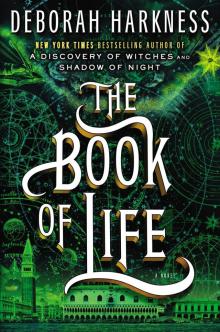 The Book of Life
The Book of Life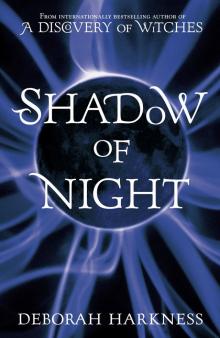 Shadow of Night
Shadow of Night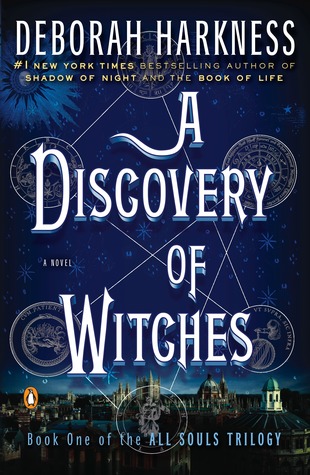 A Discovery of Witches
A Discovery of Witches The All Souls Real-Time Reading Companion
The All Souls Real-Time Reading Companion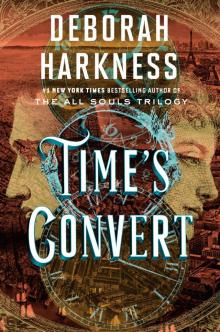 Time's Convert
Time's Convert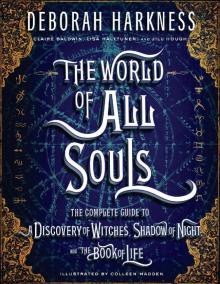 The World of All Souls
The World of All Souls A Discovery of Witches: A Novel (All Souls Trilogy)
A Discovery of Witches: A Novel (All Souls Trilogy)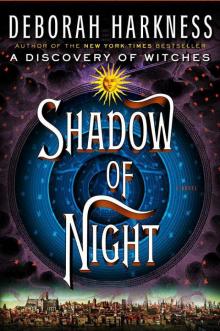 Shadow of Night: A Novel
Shadow of Night: A Novel